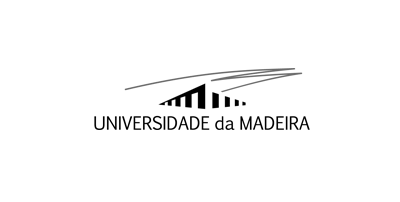Translocal
Sugestões de Leitura # 3 Espaços Performativos
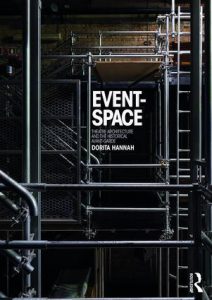 |
Dorita HANNAH (2018), Event-Space. Theatre Architecture and Historical Avant-Garde, Routledge
“Description: As the symbolists, constructivists and surrealists of the historical avant-garde began to abandon traditional theatre spaces and embrace the more contingent locations of the theatrical and political ‘event’, the built environment of a performance became not only part of the event, but an event in and of itself. /Event-Space radically re-evaluates the avant garde’s championing of nonrepresentational spaces, drawing on the specific fields of performance studies and architectural studies to establish a theory of ‘performative architecture’. / ‘Event’ was of immense significance to modernism’s revolutionary agenda, resisting realism and naturalism – and, simultaneously, the monumentality of architecture itself. Event-Space analyzes a number of spatiotemporal models central to that revolution, both illuminating the history of avant-garde performance and inspiring contemporary approaches to performance space.” + info. aqui |
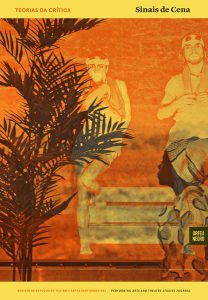 |
AAVV (2018), Sinais de Cena. Revista de Estudos de Teatro e Artes Performativas, série II, n.º 3 (jul.), Lisboa: Orfeu Negro. Descrição: “A revista Sinais de Cena ocupa uma posição de destaque entre as publicações especializadas em teatro e artes performativas em Portugal. Fundada em 2004, inaugurou, em 2016, uma segunda série sob a chancela das edições Orfeu Negro, adquirindo periodicidade anual e uma distribuição mais ampla./ O número de 2018 é dedicado ao tema «Teorias da Crítica», com a participação de vários críticos internacionais e nacionais, tais como José Maria Vieira Mendes, Francesca Rayner, Luiz Fernando Ramos, Diana Damian-Martin, José Alberto Ferreira e Gustavo Vicente, entre outros. Para além de vários ensaios sobre artes performativas, neste número destaca-se uma longa entrevista à bailarina e coreógrafa Marlene Monteiro Freitas e um portefolio dedicado ao trabalho cenográfico da malavoadora.” + info. aqui |
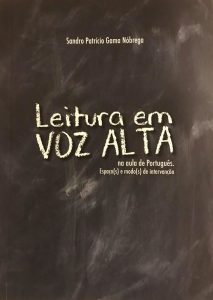 |
Sandro NÓBREGA (2018), Leitura em VOZ ALTA na aula de Português. Espaço(s) e modos de intervenção, Funchal: CMF. Versão revista da tese de doutoramento em Literatura de Língua Portuguesa – Investigação e Ensino, apresentada pelo autor à Faculdade de Letras da Universidade de Coimbra em 2015, este livro reúne um conjunto de reflexões teórico-conceptuais e de propostas práticas que demonstram quer a importância da performance no exercício de leitura literária, quer a importância da escola como espaço performativo. |
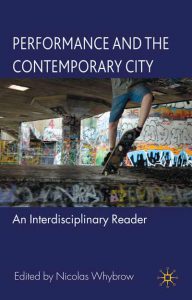 |
Nicolas WHYBROW, ed. (2010), Performance and the Contemporary City. An Interdisciplinary Reader, Palgrave Macmillan. “Description: Cities, with their rising populations and complex configurations, have become key symbols of a fast-changing modernity. This timely collection gathers together various urban writings from a range of relevant disciplines, including architecture, geography, sociology, visual art, ethnography and psychoanalysis. Its focus, however, is performance. Underscoring the importance of the field, it shows how performance functions as a dynamic, interdisciplinary mechanism which is central not only to understanding the multiplicity of urban living but also to the way the identities of cities are shaped. / Gathering together key writings on the city and performance by authors ranging from Walter Benjamin to Tim Etchells to Carl Lavery, the reader can be navigated in any number of ways. Supported by extensive introductory material, it will be essential and evocative reading for anyone interested in making connections between performance and urban life.” + info. aqui |
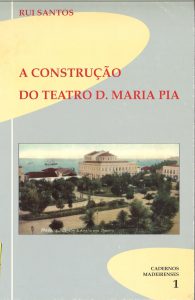 |
Rui SANTOS (1994), A Construção do Teatro D. Maria Pia, Funchal: DRAC.
Da “Introdução” do livro: “[…] A construção deste teatro teve, na época, grande repercussão. A cidade não possuía um estabelecimento onde pudessem ter lugar espectáculos de condição e «satisfazer rasoavelmente esta necessidade d’ha muito sentida e reclamada…» […]./ Não deixa de ser importante e curioso todo este processo para dotar a cidade do Funchal de uma casa de espectáculos digna do seu nome e dos seus moradores […]” |

